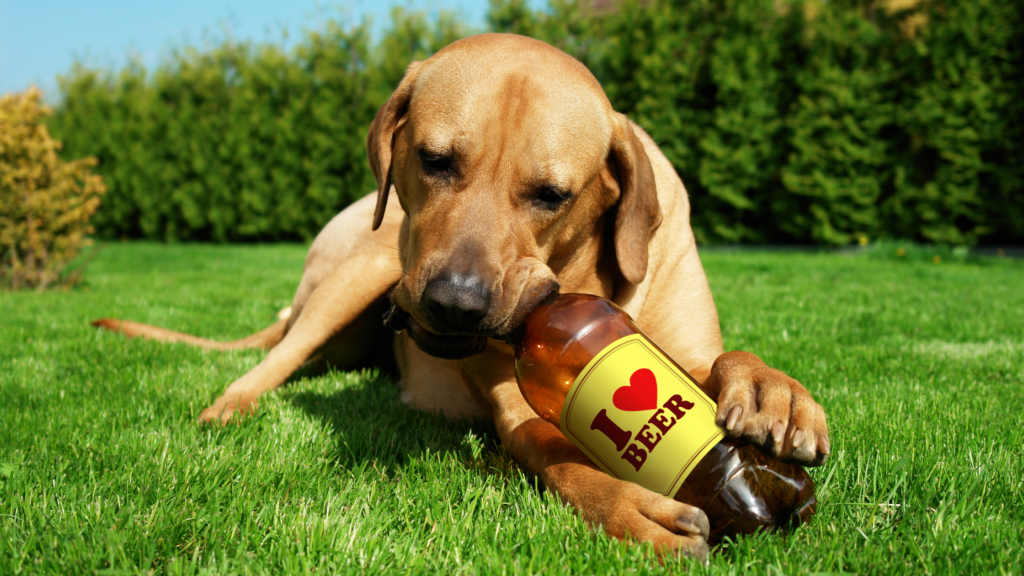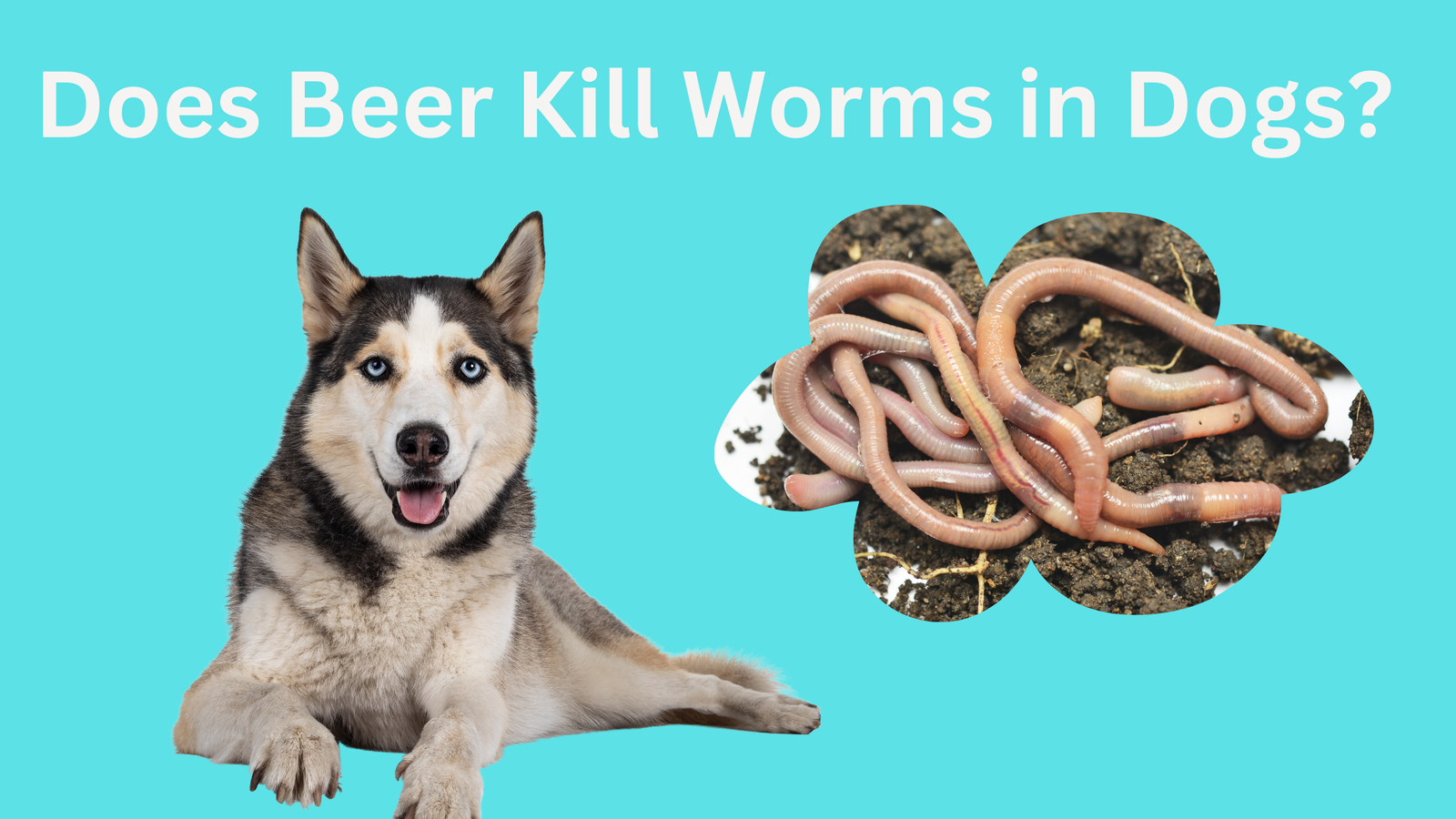As a dog owner, you may have heard about the supposed benefits of using beer to treat worms in dogs. However, there is a lot of misinformation out there. In this article, we will explore Does beer kills worms in dogs? And provide accurate information to help you make informed decisions about your furry friend’s health.
Does Beer Kill Worms in Dogs? Separating Myth from Reality

Beer is a popular beverage that many people enjoy, but can it be used to treat worms in dogs? The answer is no. Despite what some people may believe, beer is not an effective treatment for worms in dogs. In fact, giving beer to your dog can be harmful and lead to serious health problems.
Worms can cause various health issues in dogs, such as vomiting, diarrhea, and weight loss. Different types of worms can affect dogs, including roundworms, tapeworms, and hookworms, and each type requires specific treatment. When treating worms in dogs, relying on scientifically proven methods is essential.
If you suspect your dog has worms, taking them to a veterinarian for a proper diagnosis and treatment plan is crucial. Your vet may recommend deworming medication or other treatments, such as dietary changes. It’s also important to follow preventive measures, such as keeping your dog’s living area clean, regularly deworming them, and maintaining good hygiene.
In conclusion, while beer may be a popular beverage for humans, it’s not a safe or effective treatment for worms in dogs. If you suspect that your dog has worms, it’s essential to consult with a veterinarian and follow their recommended treatment plan.
Also Read: Can Dogs Eat Chicken Salad? A Guide to Safe Feeding
The Harmful Effects of Beer on Dogs
While beer is a popular beverage for humans, it can harm dogs. Dogs have a different metabolism than humans, so alcohol can have a more severe impact on them.
Even small amounts of beer can harm dogs and lead to serious health problems. Some harmful effects of beer on dogs include vomiting, diarrhea, difficulty breathing, and even coma.
Alcohol can also cause dehydration, which can be particularly dangerous for dogs, especially during hot weather.
In addition, beer contains hops, which can be toxic to dogs and cause hyperthermia, a condition that can lead to high body temperature and other serious health issues.
It’s also important to note that giving beer to your dog is not recommended to treat worms or other health conditions.
Beer has no medicinal properties and can harm your dog’s health. Instead, following a veterinarian’s recommended treatment plan and relying on scientifically proven methods to address any health issues your dog may have is crucial.
In conclusion, beer can have harmful effects on dogs, and it’s essential to avoid giving it to them. If you suspect that your dog has worms or any other health issue, it’s crucial to consult with a veterinarian and follow their recommended treatment plan.
Symptoms and Treatment of Worms in Dogs

Worms are a common health issue in dogs, and they can cause a range of symptoms that can vary depending on the type of worm and the severity of the infection.
Some common symptoms of worms in dogs include vomiting, diarrhea, weight loss, and a lack of energy.
In some cases, worms may also cause visible signs such as coughing or visible worms in the dog’s stool.
If you suspect your dog has worms, you must take them to a veterinarian for a proper diagnosis and treatment plan.
The type of worm your dog has will determine the best course of treatment. For example, roundworms and hookworms are typically treated with deworming medication, while tapeworms may require a different type of medication.
Your vet may also recommend additional treatments, such as dietary changes or supplements, to support your dog’s recovery.
Prevention is also vital in managing worms in dogs. Keeping your dog’s living area clean and free from feces can help reduce the risk of infection.
Regular deworming, based on your veterinarian’s recommendations, is also essential for keeping your dog healthy.
In conclusion, if you suspect that your dog has worms, it’s essential to consult with a veterinarian for a proper diagnosis and treatment plan.
You can help your dog recover and stay healthy with the appropriate treatment and preventive measures.
Natural Remedies for Worms in Dogs
While medication is typically the most effective way to treat worms in dogs, some natural remedies may also help support your dog’s recovery. Here are a few natural remedies that you may consider:
- Pumpkin seeds: Pumpkin seeds contain an amino acid called cucurbitin, which can help to paralyze and eliminate worms from the digestive tract. You can grind pumpkin seeds and add them to your dog’s food.
- Garlic: Garlic has antiparasitic properties and can help to eliminate worms from the digestive tract. However, it’s important to note that garlic can be toxic to dogs in large quantities, so it should only be used in small amounts under the guidance of a veterinarian.
- Diatomaceous earth: Diatomaceous earth is a fine powder made from the fossilized remains of diatoms. It can help to eliminate worms by damaging their exoskeletons. Be sure to use food-grade diatomaceous earth and follow the recommended dosage.
- Coconut oil: Coconut oil contains medium-chain fatty acids that can help to eliminate worms from the digestive tract. You can add a small amount of coconut oil to your dog’s food.
It’s important to note that while natural remedies may help support your dog’s recovery, they should never be used as a substitute for proper veterinary care. If you suspect that your dog has worms, it’s crucial to consult with a veterinarian for an accurate diagnosis and treatment plan.
Prevention Tips to Keep Your Dog Worm-Free
Preventing worms in dogs is critical to keeping them healthy and happy. Here are some tips for keeping your dog worm-free:
- Regular deworming: Regular deworming is essential for preventing worms in dogs. Your veterinarian can recommend a deworming schedule based on your dog’s age, health, and lifestyle.
- Clean living area: Keeping your dog’s living space clean and free from feces can help reduce infection risk. Regularly clean and disinfect your dog’s food and water bowls, bedding, and toys.
- Good hygiene: Practicing good hygiene can also help to prevent worms in dogs. Teach children to wash their hands after playing with the dog. Please wash your hands after handling your dog or cleaning up after them.
- Control fleas: Fleas can transmit tapeworms to dogs, so controlling fleas is essential. Use a flea preventative medication and regularly groom your dog to check for fleas.
- Avoiding contaminated soil: Dogs can pick up worms from contaminated soil, so avoid letting your dog roam in areas where other animals may have defecated.
By following these prevention tips, you can help to keep your dog worm-free and healthy. If you suspect that your dog has worms, it’s essential to consult with a veterinarian for a proper diagnosis and treatment plan.
The role of nutrition in keeping your dog’s digestive system healthy
Good nutrition is essential for maintaining a healthy digestive system in dogs. Providing your dog with a balanced and nutritious diet can help ensure its digestive system functions correctly and reduce the risk of digestive problems, including those caused by worms.
Here are some essential nutrients and dietary factors that are important for maintaining digestive health in dogs:
- Fiber: A diet high in fiber can help regulate digestion and prevent constipation. It can also help promote the growth of beneficial gut bacteria, aiding digestion and boosting the immune system.
- Protein: Protein is essential for building and repairing body tissues, including those in the digestive system. High-quality protein sources, such as meat, fish, and eggs, are critical for maintaining good digestive health.
- Probiotics: are beneficial bacteria that can help improve digestion and boost the immune system. Feeding your dog a diet that includes probiotics or providing probiotic supplements can help promote a healthy gut microbiome.
- Water: Adequate hydration is essential for maintaining good digestion. Ensure your dog has access to plenty of fresh water at all times.
- Avoiding certain foods: Certain foods, such as those high in fat or sugar, can be problematic for dogs to digest and may lead to digestive problems. Avoid feeding your dog table scraps, and stick to a balanced diet formulated specifically for dogs.
By ensuring that your dog’s diet includes these essential nutrients and dietary factors, you can help to promote good digestive health and reduce the risk of digestive problems, including those caused by worms.
The Importance of Regular Veterinary Check-ups
Regular veterinary check-ups are crucial for maintaining your dog’s health and detecting potential health issues early on. Here are some reasons why regular veterinary check-ups are so important:
- Early detection of health problems: During a veterinary check-up, your veterinarian will perform a thorough physical exam and may recommend additional tests, such as bloodwork or fecal exams. This helps detect health problems early on when they are easier to treat.
- Preventive care: Regular veterinary check-ups also allow for preventative care measures to be taken, such as vaccinations, deworming, and flea and tick prevention.
- Nutrition and weight management: Your veterinarian can also provide advice on your dog’s diet and weight management. This can help to prevent obesity and other health problems associated with poor nutrition.
- Behavior and Training: Your veterinarian can also offer guidance on behavior and training, improving your dog’s quality of life and strengthening your bond with them.
- Emergency care: Regular veterinary check-ups can also help ensure you know what to do in an emergency. Your veterinarian can advise on first aid and emergency care, which can save your dog’s life.
By scheduling regular veterinary check-ups for your dog, you can help keep them healthy and happy for years. If you have any concerns about your dog’s health, you must consult with a veterinarian immediately.
Also Read: The Best Guide to Salmon and Pollock Oil for Dogs
Frequently asked questions
What kills worms in dogs fast?
There are a few natural remedies that may help to kill worms in dogs quickly. Two of the most effective options are dry coconut and turmeric.
How do you kill worms in dogs?
The most common way to kill worms in dogs is by using a commercial dewormer prescribed by a veterinarian. There are also some natural remedies that can be effective.
Does cigarettes get rid of worms in dogs?
No, cigarettes are not an effective way to get rid of worms in dogs. In fact, smoking can be harmful to dogs and should be avoided.
Does apple cider vinegar deworm dogs?
There is limited scientific evidence to suggest that apple cider vinegar may help to deworm dogs. However, it is not considered a reliable or effective method of treatment.
What is a natural wormer for dogs?
There are several natural wormers for dogs, including pumpkin seeds, garlic, and diatomaceous earth. However, it’s important to note that natural remedies may not be as effective as commercial dewormers.
Can I treat my dog for worms without going to the vet?
While there are some natural remedies that may help to treat worms in dogs, it’s important to consult with a veterinarian to ensure that your dog receives the appropriate treatment.
How long does it take for worms to leave a dog?
The length of time it takes for worms to leave a dog’s system can vary depending on the type of worm and the severity of the infestation. In general, it can take anywhere from a few days to several weeks.
Can I touch my puppy if he has worms?
While it’s important to take precautions when dealing with a dog that has worms, there is no need to avoid physical contact altogether. However, it’s important to wash your hands thoroughly after handling your dog.
How long after deworming will my dog pass worms?
It’s not uncommon for dogs to pass worms in their feces for several days after being dewormed. However, if your dog continues to pass worms after a week or two, it’s important to contact your veterinarian.
How do I know if my dogs worms are gone?
The only way to know for sure if your dog’s worms are gone is by having a veterinarian perform a fecal exam. However, some signs that your dog’s worms may be gone include a decrease in symptoms and a general improvement in overall health.
Are worms still alive after deworming?
In some cases, it is possible for worms to still be alive after deworming. However, in most cases, the dewormer will be effective at killing the majority of worms.
When you deworm a dog, do the worms come out alive?
It’s not uncommon for worms to be passed in a dog’s feces after being dewormed. However, it’s important to note that not all worms will be visible to the naked eye.
Do dogs poop more after deworming?
It’s not uncommon for dogs to have slightly more frequent bowel movements after being dewormed. However, if your dog is experiencing diarrhea or other abnormal symptoms, it’s important to contact your veterinarian.
What is white worms in dogs poop?
White worms in a dog’s poop could be a sign of tapeworms, which are a common type of worm in dogs. It’s important to contact your veterinarian for treatment.
What happens if you don’t deworm your dog?
If you don’t deworm your dog, they can suffer from a range of health problems, including weight loss, weakness in the muscles and bones, and diarrhea (which can lead to more serious health problems like vomiting and anemia).
How quickly does dewormer work?
The effectiveness and speed of dewormer can vary depending on the type of dewormer and the type of worms being treated. Some dewormers may work within hours, while others may take several days to take effect.
How did my dog get worms?
Dogs can get worms from a variety of sources, including ingesting contaminated soil, feces, or other materials that contain worm eggs or larvae. They can also contract worms from other infected animals.
How can I deworm my dog at home?
While there are over-the-counter dewormers available, it is important to talk to your veterinarian before administering any medications to your dog. Your veterinarian can recommend the best course of treatment based on the type of worms your dog has and their overall health.
What is the best dewormer for dogs?
The best dewormer for your dog depends on their specific needs and the type of worms they have. Your veterinarian can recommend the best course of treatment and prescribe medication if necessary. Some common dewormers for dogs include fenbendazole, praziquantel, and pyrantel pamoate.
How often should I deworm my dog?
It is generally recommended to deworm your dog every 3 to 6 months, depending on your dog’s lifestyle and risk of exposure to worms.
Can humans get worms from dogs?
Yes, it is possible for humans to get certain types of worms from dogs, such as roundworms and hookworms. It is important to practice good hygiene, such as washing your hands after handling your dog’s feces, to minimize the risk of transmission.
Can dogs get worms from eating raw meat?
Yes, dogs can get worms from eating raw meat that is contaminated with parasites. It is important to properly handle and prepare raw meat if you choose to feed it to your dog.
Can I give my dog garlic to prevent worms?
Garlic is sometimes recommended as a natural remedy for preventing worms in dogs, but its effectiveness is not scientifically proven. It is important to talk to your veterinarian before giving your dog any new supplements or remedies.
Can I see worms in my dog’s poop?
Yes, it is possible to see worms in your dog’s poop if they have a heavy infestation. However, not all types of worms are visible to the naked eye.
Can I use over-the-counter dewormers for my dog?
There are over-the-counter dewormers available, but it is important to talk to your veterinarian before using them. Your veterinarian can recommend the best dewormer for your dog based on their specific needs.
How can I prevent my dog from getting worms?
You can prevent your dog from getting worms by practicing good hygiene, such as picking up and disposing of their feces promptly, and by deworming them regularly. It is also important to keep your dog away from areas where they may be exposed to parasites, such as areas with high amounts of wildlife feces.

